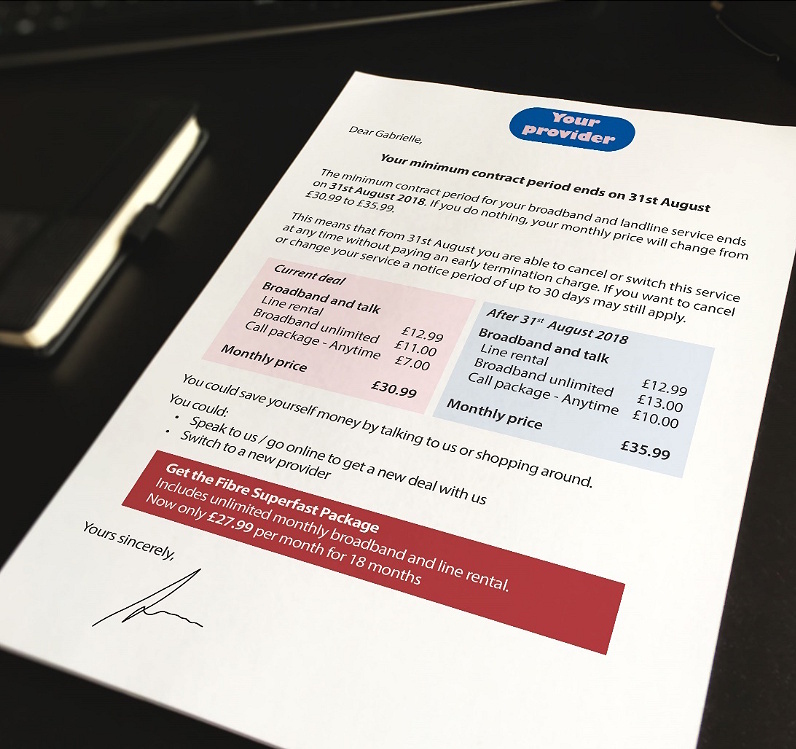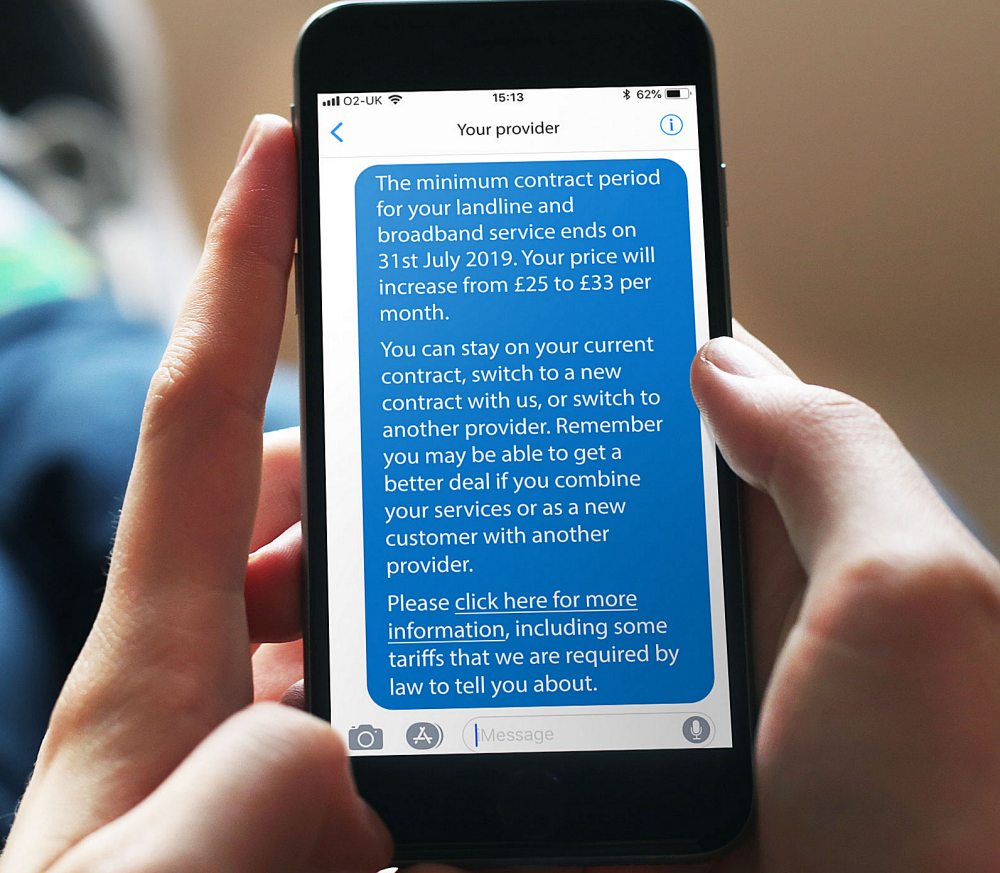Ofcom Force End of Contract Notices for UK Broadband and Mobile
Ofcom has today set out the final details of their new end-of-contract notification system (sent by text, email or letter) for UK customers of broadband ISPs, Pay TV, landline phone and mobile operators, which is designed to help tackle the so-called “loyalty penalty” and will keep consumers informed about the best available deals.
At present it’s a fairly common practice for major telecoms providers to try and attract new customers by offering big price discounts on your first minimum contract term (lasting up to 12-24 months), which occurs across nearly all service sectors and is by no means unique to broadband etc.
Discounts (special offers) like this are generally considered normal for any aggressively competitive service market, although not all ISPs are clear enough about how much you’ll pay post-contract (i.e. after your initial minimum term has ended). In particular a fair few consumers aren’t aware of when their contract term is due to end (12%) or how much they’ll be paying once it does. Likewise others may be fearful of switching complications, such as service downtime.
Advertisement
All of this has given rise to the so-called “loyalty penalty” term, which is a general reference to how consumers who remain with their provider and don’t haggle for a better price (i.e. after their minimum contract term has ended) will often end up paying more than new customers (i.e. only new customers usually benefit from the biggest discounts).
At the end of 2018 the Competition and Markets Authority (CMA) called for “urgent action” to help tackle related issues and protect vulnerable consumers (here). One part of Ofcom’s answer to that has been to develop a new contract notification system, which all providers will be expected to adopt.
End of Contract Notifications
Under the new system providers will be required to issue End of Contract Notifications to existing subscribers (usually between 10-40 days before the end of your contract). This letter or email will include the end date of your current minimum term, details on the current package and what you’ll be paying if you stay etc.
Notification Details
* The contract end date;
* The price paid before this date;
* Any changes to the service and price paid at the end of this period;
* Information about any notice period required to terminate the contract; and
* The best deals offered by their provider, including telling loyal customers what prices are available to new customers.
Providers will also be required to send a notification to all existing customers whose initial contract term has ended (sent “at least” annually). As above this notification would contain details of any changes to their price or services and let them know their options (upgrades, deals etc.). On a mobile plan this must include at least one SIM-only deal for customers on bundled handset and airtime contracts.
Advertisement
Business customers will also receive ‘end-of-contract’ notifications and best tariff information annually in a form suitable for them. Ofcom said providers will all have to “tell customers about their best available deal, both when their deals are coming to an end, and every year after that if they don’t change their deal.”
Example Letter (Article Continues Below)

Ofcom has now given providers 9 months to introduce the system (originally they proposed a six month implementation), which means that it will go live from 15th February 2020. The full statement is here.
Advertisement
Lindsey Fussell, Ofcom’s Consumer Group Director, said:
“We’re making sure customers are treated fairly, by making companies give them the information they need, when they need it.
This will put power in the hands of millions of people who’re paying more than necessary when they’re no longer tied to a contract.”
At this point we think it’s necessary to highlight that not all ISPs adopt the same model and many smaller providers, which may also offer advanced features (static IP etc.) and better service quality, simply charge a set monthly fee that rarely ever changes.
A few providers, such as TalkTalk, also offer an alternative approach by enabling existing customers to re-contract on to a lower price point than their standard rate when a contract ends. Alternatively it’s possible that a bit of haggling could save you a lot of money (see our Retentions Tips article) but only about 10% of consumers seem to ever do this (if you’re happy with the service then at least try giving negotiation a try first).
On the one hand it’s possible that we could now see more ISPs putting extra effort into offering better deals to existing subscribers. Ofcom’s approach is designed to encourage switching and the providers will no doubt seek to control that outflow. On the other hand if we do see better offers for existing customers then this may be balanced by less attractive promotions for new customers. Time will tell.
UPDATE 7:57am
The first comment has come in.
A TalkTalk spokesperson said:
“Today’s announcement is an overdue first step towards a fairer market, but consumers will be dismayed that Ofcom has bowed to industry lobbying and is now going to make customers wait longer than necessary to benefit from this change.
While most of our rivals have continued to increase the premium loyal customers pay, TalkTalk has already taken a stand against unfair pricing. Two years ago, we restructured our business to reward loyal customers. We have closed the gap between what new and existing pay and we already contact those approaching the end of their contract, encouraging them to re-sign to better deals.”
UPDATE 8:16am
The Government has also given its reply.
Margot James, UK Minister for Digital, said:
“Ofcom’s new rules will make sure consumers know when their contract ends, and help them save money by switching to a better deal. For too long, large numbers of loyal consumers have been paying too much for their telecoms services, which is why we’ve also strengthened Ofcom’s powers to create a fairer and more transparent system.”
We’ve also included an example text message picture below from Ofcom’s new system.

UPDATE 11:47
Mobile operator O2 has responded too.
An O2 Spokesperson said:
“As a customer-led organisation, O2 agrees that customers should be equipped with the right information to help them make purchasing decisions. With O2 Refresh, which separates airtime and device costs, we go further – we do not just notify customers when they have paid off their device but we immediately and automatically reduce their bills. O2 has been doing this since 2013. Citizens Advice found that customers of other networks pay £490m to contracts that would have been automatically reduced if they were with O2.”
Mark is a professional technology writer, IT consultant and computer engineer from Dorset (England), he also founded ISPreview in 1999 and enjoys analysing the latest telecoms and broadband developments. Find me on X (Twitter), Mastodon, Facebook, BlueSky, Threads.net and Linkedin.
« OpenSignal Examines UK 4G Mobile Speeds vs Spectrum Ownership
















































Comments are closed